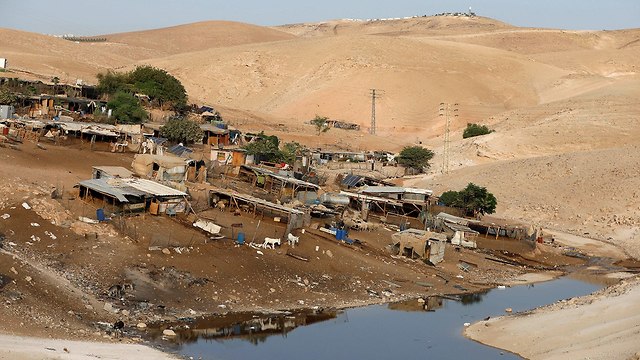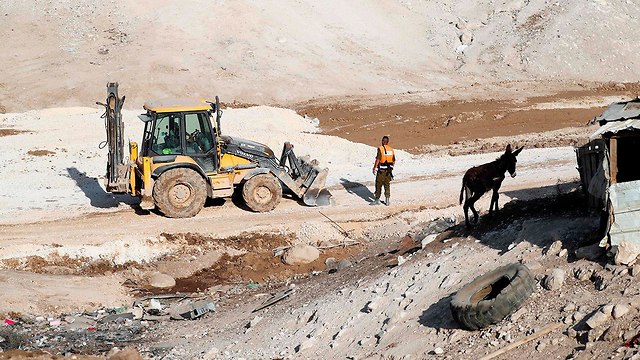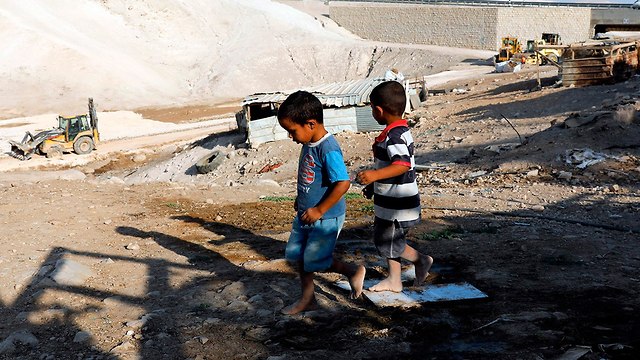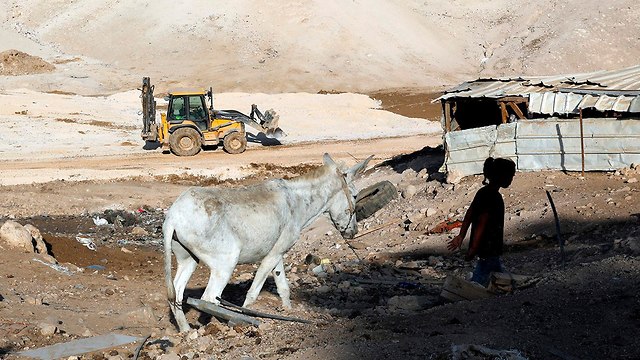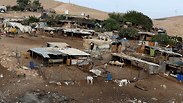

Khan al-Ahmar—the calm before the storm
Activists and residents of Bedouin village Khan al-Ahmar feel a bit more relaxed after the Cabinet decided to postpone their evacuation, but piles of tires to be scorched at demonstrations tell otherwise; 'we are even prepared to move 400 meters from the road, but not to relocate entire village,' says resident.
The sight of the entrance to Khan al-Ahmar, a Bedouin village in the West Bank slated for demolition, reflected the mood of its residents. On one hand, residents sit at leisure and smoke hookahs, and on the other, huge piles of tires, to be scorched at evacuation day, symbolize the resident's disquiet.
"I'm not happy," said resident Ahmed Abu Dahuk, who was sitting at the entrance of the central protest tent. "The decision was postponed only for a short period of time and that does not make me feel at ease."
The decision he is referring to is the Security Cabinet's decision to postpone the demolition of the Palestinian-Bedouin village by "several weeks" in an effort to reach an agreement with the residents to willingly relocate to Anata, a Palestinian village located 600 meters away.
The Palestinian Authority makes sure that its representatives stay in the village at all time, and almost every evening the Palestinian head of the Wall and Settlements Resistance Committee, Walid Assaf, arrives at the site. When we arrived to the village, Qassem Awad was on duty.
Awad, a resident of Ramallah and an activist in the Wall and Settlements Resistance Committee, admitted that this morning he heard a sigh of relief all over the village, but added that the struggle was not over. "The Israeli decision to postpone the evacuation stemmed from the pressure of the international community which argued that evacuating the village would be a war crime. We have one thing to say to Israel—you are bound to international law. That is all."
"Israel agrees to the relocation of the village because this way the Bedouin residents will clear out E1 area," he stressted
Inside the protest tent sits the village's mukhtar with a map of the area. He was on the phone, bent over the big map, and seemed preoccupied with trying to understand the proposed compromise.
"We do not want to relocate to 600 meters away, we have no problem moving 100-200 meters off the road, and you know what? Even 400 meters away, but on one condition: that we relocate to a Khan al-Ahmar territory and nowhere else," Abu Dahuk added.
As the evening shadows began to fall, the children of Khan al-Ahmar quickly and skillfully brought the herd of sheep into their pens. "Look at them—we are Bedouins." Abu Dahuk pointed out.
 |
"We do not want stone houses or permanent structures, like those offered to us near Abu Dis, we just want to continue living our life the same way we have been living since birth—like this. We know that in Israel there are those who support us and those who oppose us; we just do not know which of those will decide our fate," he concluded.














